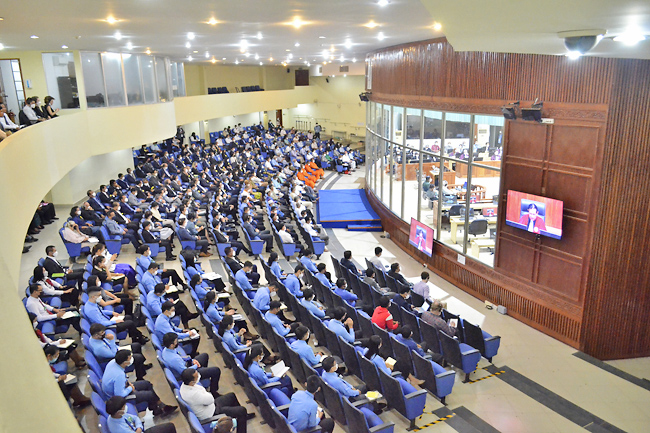PHNOM PENH (AFP) – Cambodia’s United Nations (UN)-backed Khmer Rouge war crimes court gave its final verdict yesterday, upholding the genocide conviction and life sentence imposed on the regime’s last surviving leader.
The tribunal was ruling on an appeal by Khieu Samphan, head of state for the murderous communist regime which wiped out a quarter of the Cambodian population in less than four years in the 1970s.
Survivors welcomed the verdict, the last that will be issued by the tribunal, which has cost more than USD330 million and prosecuted only five Khmer Rouge leaders, two of whom died during proceedings.
“The Supreme Court chamber finds no merit in Khieu Samphan’s arguments regarding genocide and rejects them,” Chief Judge Kong Srim said in the lengthy ruling.
The court also upheld the 2018 convictions against the 91-year-old for multiple crimes against humanity – including murder, torture and enslavement – on the basis of a “joint criminal enterprise”, even if he did not personally take part in all crimes.
It backed the earlier ruling that Khieu Samphan had “direct contemporaneous knowledge of the commission of crimes and shared the intent for their commission”.

But it reversed convictions on murder and persecution charges relating to two specific locations.
Around 500 people packed into the courtroom to hear the verdict, including monks, diplomats, government officials and Khmer Rouge survivors.
Chum Mey, 91, one of only a handful of people to survive the S-21 torture prison, where around 18,000 were butchered, welcomed the verdict.
“I am happy, the sentence is reasonable, it gives me justice,” he said.
Lim Ching, who lost more than 20 relatives, including her mother, told AFP that “the sentence is the right one – the Pol Pot regime did bad things and killed people”.
The hybrid court, with both Cambodian and international judges, was set up to try the senior leaders of the genocidal regime, which wiped out about two million people through starvation, torture, forced labour and mass executions during its 1975-79 rule.
Regime chief Pol Pot, known as ‘Brother Number One’, never faced justice, dying in 1998 before the court was set up.
The genocide conviction relates to the persecution of ethnic-minority Vietnamese, seen by the Khmer Rouge as treacherous enemies within.
Judge Kong Srim said the charges related to “some of the most heinous events” during the Khmer Rouge’s blood-soaked rule.
The frail Khieu Samphan sat hunched in a wheelchair in the dock, listening intently to the lengthy ruling through headphones.
His argument that the Khmer Rouge was simply a political movement, aimed at improving the lives of Cambodians, was rejected by the court.
“By no stretch of the imagination could it be seriously stated that the CPK revolution was implemented in a benevolent or altruistic manner,” the ruling said, using an abbreviation for the Communist Party of Kampuchea, the Khmer Rouge’s official name.
Alongside Khieu Samphan in the 2018 case, ‘Brother Number Two’ Nuon Chea was also sentenced to life for genocide and other crimes, including forced marriages and rapes.
Nuon Chea died in 2019.
Both men were given life sentences by the court in 2014 for crimes against humanity in another case related to the violent forced evacuation of Phnom Penh in April 1975, when Khmer Rouge troops drove the population of the capital into rural labour camps.


